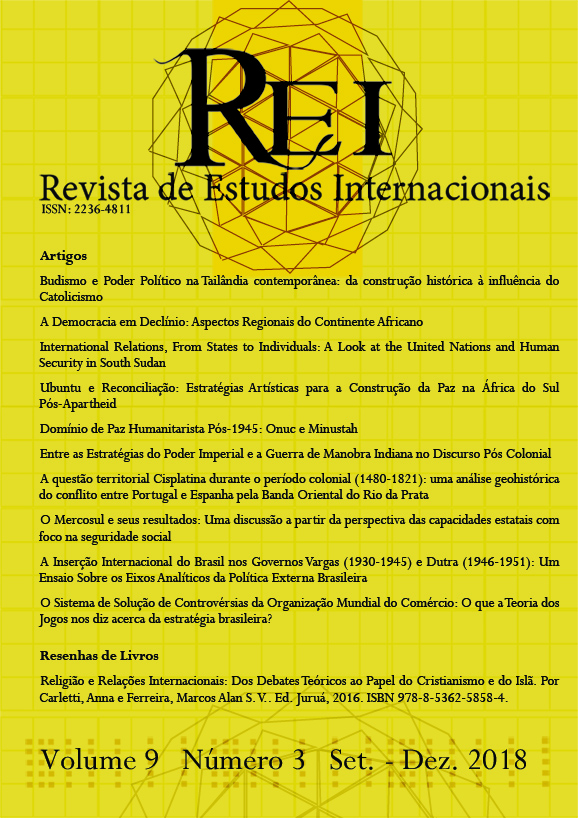UBUNTU E RECONCILIAÇÃO: ESTRATÉGIAS ARTÍSTICAS PARA A CONSTRUÇÃO DA PAZ NA ÁFRICA DO SUL PÓS-APARTHEID
Palavras-chave:
Construção da Paz, Transformação de conflitos, África do SulResumo
Objetiva-se, neste artigo, analisar a atuação da organização sul-africana Artist Proof Studio (APS) e sua importância com ações locais nas comunidades para resgatar o conceito de Ubuntu e mitigar conflitos. Partindo de como as violências direta, estrutural e cultural, moldaram o contexto específico da África do Sul durante o regime de Apartheid, é apresentada uma descrição do conceito de Ubuntu, que remete à antiga filosofia africana que trata de nutrir o sentimento de unidade entre os indivíduos como forma de consolidar a comunidade. Apontaremos, então, sua significação e aplicação na África do Sul. Em seguida, abordaremos como as estratégias artísticas constituem uma abordagem viável para a Construção da Paz, colaborando para a transformação de conflitos. Por fim, no contexto pós-Apartheid, verificaremos a atuação da organização Artist Proof
Studio (APS) que, através de iniciativas artísticas baseadas na comunidade, resgatou o conceito de Ubuntu e promoveu o processo de reconciliação. Sendo assim, será observado como as artes fortalecem esse conceito na África do Sul, facilitando o processo de reconciliação e de construção da paz.
Referências
APS - ARTIST PROOF STUDIO (2013). Annual Report 2013, Johannesburg, publicado em
[http://artistproofstudio.co.za/wp-content/uploads/2015/05/APS-Annual-Report-2012-13.pdf].
Disponibilidade: 22/03/2017.
_______________ (2015). Annual Report 2014-2015, Johannesburg. publicado em
[http://artistproofstudio.co.za/wp-content/uploads/2015/05/APS-Annual-Report-2014-15.pdf].
Disponibilidade: 22/03/2017.
BERMAN, Kim; SELIBE, Daniel Stompie (2005). Artist Proof Studio: A Journey of
Reconciliation. Waltham/MA: Brandeis University. Publicado em:
[http://www.brandeis.edu/ethics/peacebuildingarts/pdfs/peacebuildingarts/kim%20artist_proof_stud
io-1.pdf]. Disponibilidade: 22/03/2017.
BINSBERGEN, Win van (2001). Ubuntu and the Globalization of Southern African Thought and
Society. Quest (Centre for Development Studies, University of Groningen), 15 (1-2): 53-90.
BOAL, Augusto (2009). Estética do Oprimido. Rio de Janeiro: Garamond.
BONAMIGO, Gilmar Francisco (2016). O problema do humano em Emmanuel Lévinas. O que nos
faz pensar, 25 (38): 139-60.
BOOTH, Ken (1991). Security and emancipation. Review of International Studies, 17 (4): 313-
_______________ (2007). Theory of World Security. New York: Cambridge University Press.
BRAGA, Pablo de Rezende Saturnino (2011). A Rede de Ativismo Transnacional contra o
Apartheid na África do Sul. Brasília: Fundação Alexandre de Gusmão.
BRANDEIS UNIVERSITY (2017). Recasting Reconciliation Through Culture and Arts,
publicado em [https://www.brandeis.edu/ethics/peacebuildingarts/recasting/index.html].
Disponibilidade: 22/03/2017.
CHAPLIN, Kevin (1996). The Ubuntu Spirit of African Communities. Council of Europe.
COHEN, Cynthia (2003). Engaging with the Arts to Promote Coexistence. In MINOW, Martha &
CHAVES, Antonia. (org.). Imagine Coexistence: Restoring Humanity after Violent Ethnic
Conflict. Hoboken/NJ: Jossey-Bass.
_______________ (2005). Creative Approaches to Reconciliation. In FITZDUFF, Mari & STOUT,
Christopher E. (org.). The Psychology of Resolving Global Conflicts: From War to Peace;
Volume 3 Interventions, Westport, CT: Greenwood Publishing Group.
_______________ (2015). State of the Art - Arts and Building Peace: Affirming the Basics and
Envisioning the Future. Insights (United States Institute of Peace): 5-7.
CONCHA, Percy Calderón (2009). Teoría de Conflictos de Johan Galtung. Revista Paz e
Conflictos, 2 (1): 60-81.
DOLAMO, Ramathate (2013). Botho/Ubuntu: The heart of African Ethics. Scriptura, 112 (1): 1-
GALTUNG, Johan (1969). Violence, peace, and peace research. Journal of peace research, 6 (3):
-191.
______. (2000). Conflict Transformation by Peaceful Means (The Transcend Method).
Geneva: United Nations Disaster Management Training Programme.
LEDERACH, John Paul (2003). Conflict Transformation. In BURGESS, Guy; BURGESS, Heidi.
(org.). Beyond Intractability. Boulder: Conflict Information Consortium, University of Colorado.
Publicado em: [http://www.beyondintractability.org/essay/transformation]. Disponibilidade:
/03/2017.
LIMA, José Gllauco Smith Avelino de; GERMANO, José Willington (2012). O Pós-Colonialismo e
a Pedagogia de Paulo Freire. Inter-Legere, (11): 198-27.
LOUW, Dirk (2010). Power sharing and the challenges of Ubuntu ethics, publicado em
[http://uir.unisa.ac.za/bitstream/handle/10500/4316/Louw.pdf]. Disponibilidade: 22/03/2017.
MACHADO, Ricardo (2015). Ubuntu: filosofia africana confronta poder autodestrutivo do
pensamento ocidental, avalia filósofo, publicado em Opera Mundi
[http://operamundi.uol.com.br/conteudo/samuel/42253/ubuntu+filosofia+africana+confronta+poder
+autodestrutivo+do+pensamento+ocidental+avalia+filosofo.shtml]. Disponibilidade: 06/05/2018.
MANDA, David Suze (2009). Ubuntu philosophy as an African philosophy for Peace, publicado
em African Files [http://www.africafiles.org/article.asp?ID=20359#]. Disponibilidade: 22/03/2017.
MUGUMBATE, Jacob; NYANGURU, Andrew (2013). Exploring African Philosophy: The value
of Ubuntu in Social Work. African Journal of Social Work, 3 (1): 82-100
MULLER, Jean-Marie (1998). O Princípio da Não-Violência – Percurso Filosófico. Almada:
Instituto Piaget.
NABUDERE, Dani W. (2005). Ubuntu Philosophy: Memory and Reconciliation, publicado em:
[repositories.lib.utexas.edu/bitstream/handle/2152/4521/3621.pdf?sequence=1&isAllowed=y].
Disponibilidade: 21/03/2017.
PEREIRA, Analúcia Danilevicz (2008). Apartheid: Apogeu e crise do regime racista na África do
Sul (1948-1994). In MACEDO, José Rivair (org.). Desvendando a história da África [online].
Porto Alegre: Editora da UFRGS, 139-57.
PINTO, Simone Martins Rodrigues (2007). Justiça Transicional na África do Sul: Restaurando o
passado, construindo o futuro. Contexto Internacional, 29 (2): 393-421.
PRAEG, Leonhard (2014). A Report On Ubuntu. Pietermaritzburg: University of KwaZulu-Natal
Press
ROSOUX, Valérie (2007). Arts et Résolution des Conflits. In MASSART-PIERARD, Françoise
(Org.). Culture et relations internationales. Louvain-la-Neuve : Presses universitaires de Louvain,
-10.
SHANK, Michel; SCHIRCH, Lisa (2008). Strategic Arts Based Peacebuilding. Peace & Change,
(2): 217-42.
SIMPSON, James G. R. (2012). The Boipatong massacre and South Africa’s democratic
transition. Leiden : African Studies Centre.
SIGGER, D. S.; POLAK, B. M.; PENNINK, B. J. W. (2010). “Ubuntu” or “Humanness” as a
management concept. Groningen: Centre for Development Studies (CDS Reseach Report, Nº 29).
TOM, Patrick (2015). A “post-liberal peace” via Ubuntu?. Peacebuilding, 6 (1): 65-79.
VASCONCELOS, Francisco Antonio de (2017). Filosofia Ubuntu. Logeion – Filosofia da
Informação, 3 (3): 100-112. Publicado em [http://revista.ibict.br/fiinf/article/view/3841].
Disponibilidade: 06/05/2018.
WEBEL, Charles; GALTUNG, Johan (2007). A Handbook of Peace and Conflict Studies.
London and New York: Routledge.


